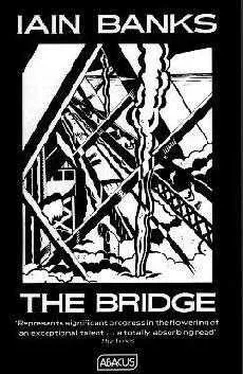The advocate had left him his golfclubs. He had to smile; it was a nice gesture. He left his wife - who had her own money - the house in Moray Place. The son got all his law books and the two most valuable paintings; Andrea was to have the rest, save for a few thousand to go to the son's own children and some nieces and nephews, and a couple of charitable bequests.
The son was busy with the estate, so he and Andrea drove Mrs Cramond to Prestwick for her night flight to the USA. He held onto Andrea's slim shoulders and watched the aircraft climb, curving over the dark Clyde, heading for America. He insisted on waiting until they could no longer see it, so they stood and watched its winking lights grow smaller and smaller against the last glow of the day. Somewhere over the Mull of Kintyre, when he'd almost lost sight of it, the jet climbed out of the shadow of the earth and into the retreating sunlight; its vapour trail blazed suddenly, glorious pink against the deep, dark blue. Andrea caught her breath, then gave a small laugh, the first since she'd heard the news about her father.
In the car, driving north by the side of the deep, dark river, he confessed he hadn't known the trail would suddenly appear like that, and after a moment's hesitation, he told her about trying to follow the Paris-bound jet a year earlier. Sentimental fool, she told him, and kissed him.
They went to see his father, then took a few days off; she had two weeks before she had to go back to Paris, and he had no urgent work so they just drove wherever they wanted for the next few days, staying in small hotels and bed-and-breakfasts and not knowing where they'd be heading when they got up each morning. They went to Mull, Sky, Cape Wrath, Inverness, Aberdeen, Dunfermline - where they stayed with Stewart and Shona - then by-passed the Bridges and the city to head via Culross and Stirling, Blyth Bridge and Peebles to the borders. It was her birthday while they were away; he bought her a bracelet in white gold. They were heading back to Edinburgh from Jedburgh, on the last day, when she saw the distant tower. 'Let's go there ,' she said.
They could only get within half a mile with the Saab; they parked oil a narrow, deserted road, she put on her Kickers, he lifted his camera and they tramped across a field then up through a wood and thick bracken, uphill towards the tower which stood on a broad summit of rock and grass. He hadn't realised it was so huge, from the road. It was massive; a local laird's solution to local unemployment at the start of the previous century, as well as a monument to a man and a great battle.
Its dark stones seemed to rise for ever into the wind; a heavy grey superstructure of wood protruding at the top held what looked like an open viewing platform beneath a conical wooden spire. He'd have imagined there would be a road up to such a place, a car park, a souvenir shop, turnstiles; officials and tickets and commerce. There didn't even seem to be a path. They stood, craning their necks looking up at it. The view just from the hillside was impressive enough. He took some photographs.
She turned, grinning, to him. 'What did you say this place was called?' He looked at the map he was carrying, shrugged.
'Penielhaugh, I think,' he said. She laughed.
'Penile-haugh. Wonder if we can get inside.' She went to a small door. There were three large boulders resting against it. She tried to roll them away.
'You'll be lucky,' he told her. He pushed and heaved the rocks away. The little door opened. She clapped her hands and went in.
'Wow,' she said, as hejoined her. The tower was hollow, just a single tube of stone. It was dark, the earth floor was covered in pigeon droppings and tiny, soft feathers, and the noise of the disturbed, cooing birds echoed faintly in the darkness. Sudden flapping sounded like fading, uncertain applause. High above, a few birds flew across dusty beams of light shining from the wooden cupola. The air was rich with the smell of the birds. A single narrow stairway - stones set jutting from the wall - spiralled up into the light-capped gloom.
'Amazing place,' he breathed.
'How sweet the sound ... Tolkienesque, as they used to say,' she said, her head back, looking straight up, mouth open. He went over to the bottom of the spiralling stairs. There was a narrow metal rail set on spindly, rather rusted-looking rods. He thought: a century and a half old, if it's original. More. Even older. He shook it, dubious.
'Think it's safe?' she asked him. Her voice was low; he looked up again. It looked like a very long way to the top. A hundred and fifty feet? Two hundred? He thought about the rocks which had been rolled against the door. She gazed up too, caught a falling feather and looked at it. He shrugged.
'What the hell.' He started up the stone steps. She started after him immediately. He stopped. 'Let me get ahead a bit first; I'm heavier.' He went on up another twenty or so steps, keeping his feet close to the wall, not using the iron rail. She followed, not coming too close. 'Probably quite all right,' he told her half-way up, looking down towards the small circle of dark spattered earth at the base of the tower. 'Probably find the local rugby team trains by running up and down this every day.'
'Sure,' was all she said.
They got to the top. It was a broad, octagonal platform of grey-painted wood; thick timbers, solid planks and a firm, secure set of rails. They were both breathing hard when they got there. His heart was hammering.
It was a clear day. They stood getting their breath back, the wind stroking their hair. He breathed in the fresh, cool air and walked round the airy circle, drinking in the view and taking a few photographs.
'Think we can see England from here?' she said, coming over to him. He was gazing north, wondering if a distant smudge on the horizon, over the other side of some distant hills, was above Edinburgh. He made a mental note to buy a pair of binoculars for keeping in the car. He looked round.
'Soitinly,' he said. 'Good grief, you could probably see your mother from here on a really clear day.'
She put her arms round his waist and cuddled him, her head on his chest. He stroked her hair. 'Really?' she said. 'How about Paris?'
He sighed, looked away from her, over the border countryside, across low hills, woods and fields and hedges. 'Yeah, maybe Paris.' He looked into her green eyes. 'I think you can see Paris from almost anywhere.' She said nothing, just hugged him some more. He kissed the crown of her head. 'Are you really coming back?'
'Yes,' she said, and he could feel her head nodding, rubbing against his chest. 'Yes, I'm coming back.'
He gazed at the distant landscape for a while, watching the wind move the tops of the serried firs. He laughed once, just a sudden shrugging motion of his shoulders, a noise in his chest.
'What?' she said, not looking up.
'I was just thinking,' he said. 'I don't suppose if I asked you to marry me, you'd say yes, would you?' He stroked her hair. She looked up slowly, an expression he could not read shown on her calm face.
'I don't suppose I would either,' she said slowly, her eyes flickering, switching from one of his eyes to the other, a tiny frown etched in between her deep, dark brows. He shrugged, looked away again.
'Well, never mind,' he said.
She hugged him once more, head on chest. 'Sorry kid. It'd be you, if anybody. It just isn't me.'
'Yeah, what the hell,' he said, 'I don't suppose it's me either. I just don't want to be apart from you for so long again.'
'I don't think we ever have to be again.' The wind blew some of her red, glossy hair up against his face, tickling his nose. 'It isn't just Edinburgh, you know, it's you as well,' she told him quietly. 'I need my own place, and I dare say I'll always be too easily led astray by a soft voice or a nice bum, but... well, it's up to you. You sure you don't want to look for a nice wee wifey?' She looked up at him, grinning.
Читать дальше












